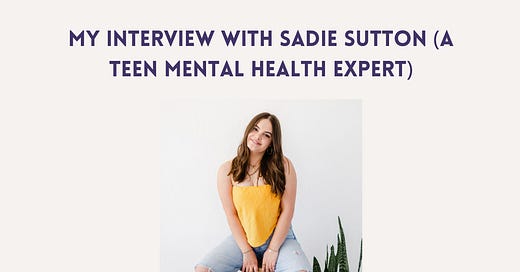Austin Scholar #59: My Interview with Sadie Sutton (A Teen Mental Health Expert)
& Why I Care So Much About Mental Health
Hey, y'all!
This week from Austin Scholar...
Austin’s Anecdote: Why I Care So Much About Mental Health
My Interview with Sadie Sutton (A Teen Mental Health Expert)
Scholar’s Sources: My Favorite Resources on Mental Health
Happy Easter, everyone! My little sister’s birthday was yesterday (she turned fifteen?!), so it’s already been an exciting weekend.
I’m also getting into hardcore studying mode. As AP tests keep getting closer, the time I spend taking practice tests and going through flashcards is dramatically ramping up. Wish me luck!
Austin’s Anecdote: Why I Care So Much About Mental Health
I’ve talked a lot about my mental health journey in previous newsletters. The short version: I’d been having trouble for a while, but the COVID lockdown hit me really hard.
I was in intensive in-patient therapy for the first half of my freshman year of high school. It was incredibly challenging. But, I came out of it stable–and actually a little bit okay.
For six months after I left therapy, I dreamed about helping thousands of kids with their own mental health and to help parents figure out what was going on in their kids' heads. But I would just feel so sad every time I worked on it, so I transitioned into education :)
That’s why I was so incredibly inspired when I found Sadie Sutton, who created the She Persisted podcast. She Persisted is a mental health podcast where Sadie–who’s 19 years old–dives into every aspect of mental wellness in an authentic, accessible, relatable way.
I reached out to Sadie for an interview on my newsletter, and she was kind enough to agree. We ended up having a really interesting conversation–which had me jumping around with excitement after we were finished.
So, here’s my super awesome, insanely insightful interview with Sadie Sutton:
My Interview with Sadie Sutton (A Teen Mental Health Expert)
Me: Would you mind talking a bit about your story? What motivated you to create She Persisted?
Sadie: In eighth grade, I began struggling with low moods and had issues with sleep–common signs of depression in teenagers. I sought treatment, starting with my primary care doctor (which is a great place to begin if you need mental health support but aren’t sure where to start).
I tried various treatments, including a year and a half of intensive outpatient programs, hospital stays, inpatient programs, family therapy, and so much more. Despite all of these efforts, I still struggled with depression, anxiety, self-esteem, relationships, self-harm, and suicidal ideation.
I was lucky to attend a good, DBT-focused residential program, which allowed me to turn things around. For the first time, I trusted others to help me. I invested myself in the treatment and saw the wisdom in mental health recovery.
I cultivated a tiny bit of self-compassion and had hope from knowing that we were doing an evidence-based treatment that had tons of research supporting its effectiveness for teens who were struggling with the same issues that I was.
I built the foundation for my mental health, learned coping skills and balanced medications.
Eventually, I realized that everyone who told me that I would recover–was right. It was possible to improve my mental health, even as a teen.
As a teen, it was important for me to share with others where I had been, as I could be living proof to them that recovery was possible. I had access to a lot of mental health resources that I wished I knew about earlier in my journey, so I started sharing my insights and skills with others through my podcast, She Persisted.
It's been almost four years now, and on She Persisted, we’ve had conversations about every aspect of mental health, including relationships, self-harm, suicidal ideation, depression, anxiety, and so much more.
I'm proud of the skills I learned during treatment that I still use to maintain my mental health today.
I love your mission of letting teens know that it will get better. What are the thoughts and mindset that cause teens to believe–wholeheartedly–that it can’t?
75% of mental illnesses develop by the age of 18 or 24, making adolescence a critical period for mental illness development.
Teenagers are in a vulnerable period due to hormonal and emotional changes, an underdeveloped prefrontal cortex, and ineffective problem-solving skills. Putting it all together, then, when you are predisposed to being more emotional and less rational, mental health struggles emerge.
And, as a teen, you have all of these pivotal moments–whether it's the relationships you're building, trying to decide what your passions are, deciding what you want to do for college, etc.
You're getting graded on all of these things that you're told are going to impact your future so significantly, which can be really, really challenging to navigate.
Also, teens tend to have a tendency to put more emphasis on the present than is realistic and accurate, which leads to feeling super overwhelmed.
It's so important to educate teenagers on how to handle mental health struggles effectively and for parents to work on strengthening their relationships with their children.
How do you think that teens’ poor mental health impacts their relationship with their parents? What do you think is one next step that parents could take to help bridge that connection again?



